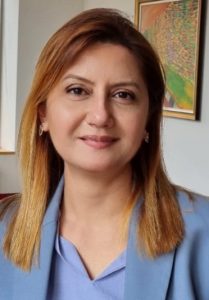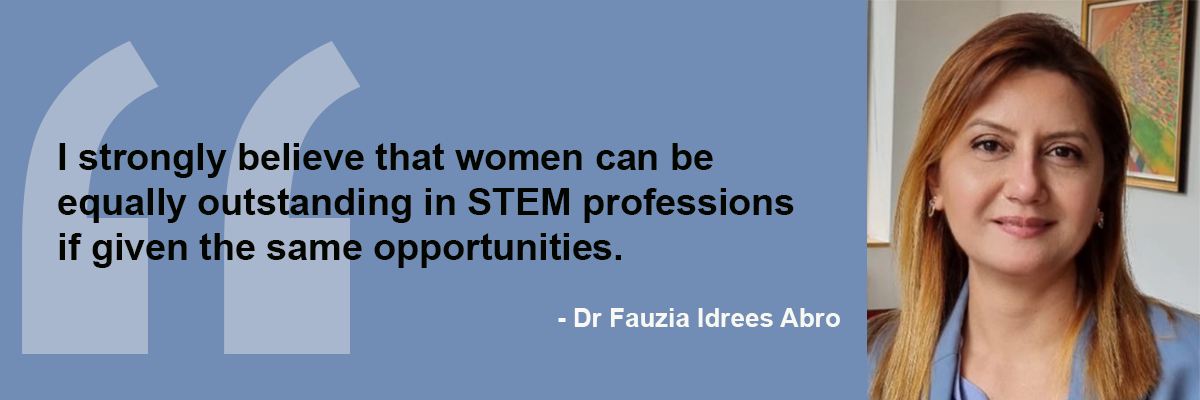Dr Fauzia Idrees Abro (PhD, Information Security, 2018) is a Cyber Security expert and a champion of women in STEM. Acutely aware of how difficult it can be for women to get a higher education, she supports women’s success through her non-profit organisation WiSTEM in Pakistan. Fauzia also leads by example as CEO of her own company.
 “Getting an education was difficult due to social and cultural traditions. Despite this, my parents broke tradition and supported my thirst for higher education,” Dr Fauzia Idrees Abro says.
“Getting an education was difficult due to social and cultural traditions. Despite this, my parents broke tradition and supported my thirst for higher education,” Dr Fauzia Idrees Abro says.
In Fauzia’s own words, she grew up in a remote area in Pakistan and faced many obstacles, but with her family’s help, she completed an Engineering degree and joined male-dominated workforces such as the military, defence and automobile industries, and academia.
“My Engineering final year project was on Cellular Mobile Security which earned me the Institution of Electrical and Electronics Engineers Pakistan (IEEEP) Gold Medal. The project sparked my interest in Cyber Security. My passion for security grew after working in the Military as most of my work there was related to information security. While working in the Military, I did my Master’s in Information Security and Cryptology which further developed my curiosity and passion for the field.”
Having already established a career in the industry, Fauzia decided to pursue a PhD in Information Security Engineering at City, University of London. It’s a choice she says opened new doors for her.
“I feel proud of being affiliated with a global university which provided a roadmap to my academic and career excellence. The education at City has tremendously polished my research, critical thinking, and analytical skills. After my PhD from City, it became much easier for me to pursue my career opportunities worldwide. At City, I got the chance to meet well-integrated people from diverse backgrounds,” Fauzia says.
STEM subjects include Science, Technology, Engineering, and Mathematics, and Fauzia is highly aware that her academic progression is the exception rather than the rule.
“Like in the rest of the world, women and girls are underrepresented in all STEM fields in Pakistan. Statistics say that only nine percent of research fields in the public sector [in Pakistan] are made up of women and this is extremely alarming. I strongly believe that women can be equally outstanding in STEM professions if given the same opportunities.”
To give more women the opportunity to pursue an education in STEM and find equal opportunities in the field, Fauzia created a non-profit organisation for women in Pakistan called Women in Science, Technology, Engineering & Mathematics (WiSTEM).
“I realized that there should be a platform which can encourage and provide guidance and support to the girls who have the potential to prosper in STEM. Recent studies have shown that students get a lot of inspiration if they have counselling and role models to follow,” Fauzia says.
“We provide learning and networking opportunities to allow them to gain financial independence either by getting jobs or starting their own businesses. I have been motivating the youth to become STEM professionals at different forums ranging from media interactions to guest lectures at academic institutes. It has always been my dream to be a role model for other women to become successful professionals and this platform provides me with an excellent opportunity to work in unison with other bodies to transform my dreams into a reality. I also intend to use this platform to influence governmental institutes to formulate policies and necessary regulations that can help in tackling the challenges faced by women in STEM.”
Fauzia supported City’s campaign to launch the British Council Scholarship for Women in STEM for South Asian women last year. This year, City successfully received funding to offer this scholarship programme again and enable up to six women from Afghanistan, Bangladesh, India, Nepal, Pakistan, Sri Lanka to complete a postgraduate degree at City.
“Women are underrepresented in STEM fields and there is a need to introduce such initiatives to bridge this gap. I have seen many women struggle with securing external funding for them to pursue their careers in STEM. The untapped potential of brilliant women who could not get STEM education due to multiple reasons represents an important loss of opportunity, both for the women themselves as well as for society,” Fauzia says.
Fauzia’s wish to be a role model to other women has already become a reality. She has received several awards and accolades for her work, including the 2020 Study UK Alumni Award in Pakistan in the Entrepreneurial category. She is the CEO of her own Cyber Security venture: Cynosure Technologies.
“It is not easy to establish a business in Pakistan owing to several challenges. Financial support is the major challenge; it is difficult to find investors due to security concerns and the economic uncertainties of the region. Furthermore, there are social and cultural challenges that obstruct women in entrepreneurship. I have been lucky enough to overcome these challenges thanks to the profound support I found flooding in from my friends and family.”
Before embarking on an MBA at Kent Business School last year, Fauzia was also the Director of Business Incubation Centre, and Cybersecurity Program Coordinator at Dawood University of Engineering and Technology.
What has Fauzia learnt in her career that she can share with us?
“There are no shortcuts to success. The journey is long and rough but difficult roads often lead to beautiful destinations. Be persistent, be courageous and choose the career that inspires you the most. Your career reins should be in your hands.”
She is optimistic about Cyber Security as a career path.
“Cyber Security provides unlimited growth, if you choose this path, you’ll always have room to grow. You’ll continuously be learning new skills and working to understand new technologies. New challenges will keep popping up and you’ll be exposed to new people, situations, and opportunities.”
What challenges and opportunities does Fauzia hope for in the future?
“In the next 2 to 5 years, I would like to expand my global network through collaborations and engage those organizations and individuals who are interested to work for the empowerment of women in Cyber Security. I’m looking forward to creating an environment where we can provide equal opportunities to talented girls and women to become true professionals in the areas of STEM and Cyber Security.”
Big thank you to Dr Fauzia Idrees Abro for sharing her story! Fauzia was a panel member at the “The Future of Cyber Security” event at City earlier this year, and you can watch the event recording here.
